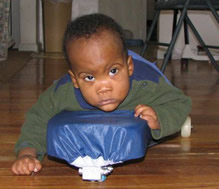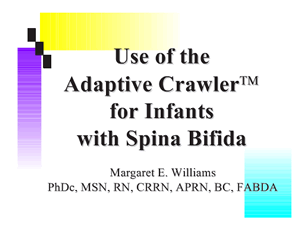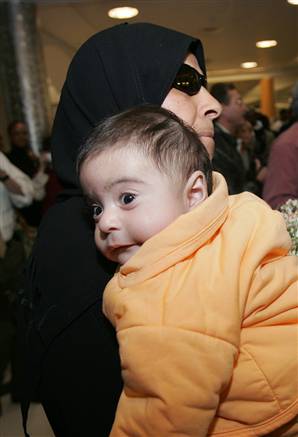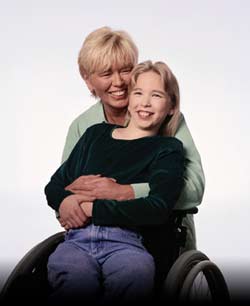News and Accouncements
Do You Have an Infant with Spina Bifida?
If so, you and your infant are invited to be part of a research study.
This study will examine how using an adaptive crawler™ will improve your infant's ability to play and to explore at the same age as infants typically crawl. Also, children with spina bifida tend to have problems physically, mentally, and socially. This research study will examine how using an adaptive crawler™ may help your infant develop physically, mentally, and socially.
The adaptive crawler™ is a simple device that may help your infant with spina bifida to play and to explore. You will be given an adaptive crawler™ for you and your infant to use in your home. The researcher will come to your home every two months to videotape your infant using the adaptive crawler™. The researcher will also ask simple questions about your infant's development. The study will last 6 months.
Participation in this study has minimal risks and the potential to greatly benefit your infant. Your child may benefit physically, mentally, and socially. Your relationship with your infant may also benefit.
To participate in this study, please call the researcher (Margi Williams) at 770-992-7540. Margi is a rehabilitation nurse at Children's Healthcare of Atlanta and a PhD student in nursing at Georgia State University. This research is supported both by Children's Healthcare of Atlanta and Georgia State University, Atlanta, GA.
NOTE: SBAG is posting this notice as a service for its members but is not endorsing, involved with, or responsible for any outcome or event that may occur during or as a result of this study.
View slide presentation about Adaptive Crawler.
Permission to Give Contact Information to SB Researcher (PDF Form)
How You Can Help SBAG
Now, more than ever we need for you to join SBAG, renew your membership in SBAG, or make a tax deductible contribution. Please act now to help us help others.
SBA Kids' Program
Parents who are interested in involvement with the 2006 SBA Kids' Program, in June in Atlanta, please contact Judy Thibadeau, SBAG, 404-783-3374.
There are many ways to be involved, both in the planning and preparation and during the actual program. Your help is needed to make this program better than ever.
Baby Noor
SBAG knows that many people are interested in Baby Noor and how she is doing. To learn more, go to our News Links section, where we have posted a number of links to stories about Baby Noor.
Denials from Katie Beckett Waiver Program
SBAG is concerned about the recent rash of denials to families who are trying to renew their annual waivers through the Katie Beckett Medicaid program. Right now, everyone affected or potentially affected should contact Pat Nobie with the Governor's Council on Developmental Disabilities by telephone at 404.657-7409.
Others you may wish to contact are your elected state representatives and Governor Sonny Perdue via the State of Georgia Web site (you can send him comments from this link) or by telephone at 404-656-1776. SBAG Membership Drive
Now, more than ever we need for you to join SBAG, renew your membership in SBAG, or make a tax deductible contribution. Please act now to help us help others.
Fill out our Survey
SBAG wants to hear from adults in Georgia who have spina bifida. We are looking into better ways to provide services and information for you. Please take a few minutes to fill out this survey and either email to sbag@bellsouth.net or mail it back to:
SBAG
1448 McLendon Drive,
Suite B,
Decatur, GA 30033.
Organization History
The Spina Bifida Association of Georgia, previously the Spina Bifida Association of Atlanta, Georgia, was founded in 1976 by a group of parents of children with spina bifida. At that time the organization's focus was on support and crisis management for the families. Over a period of years, SBAG funded several research projects at Scottish Rite Children's Hospital and in 1986, the Association provided $100,000 in funding for a room at the Shepherd Center in return for the development of a habilitation program for children with spina bifida. The needs of people with spina bifida and their families changed significantly in the 1980s and SBAG has responded to these changes. Children with spina bifida can now expect to live to adulthood. Moreover, according to some published research, women can reduce the risk of having a baby born with spina bifida by up to 50% to 75% by consuming 400 micrograms of folic acid before and during the first three months of their pregnancy.
The Spina Bifida Association of Georgia is a nonprofit association whose mission is to promote the achievement of full potential for people born with spina bifida while emphasizing the prevention of this birth defect. The focus of SBAG is threefold:
Fostering inclusion and independence for people with spina bifida.
Preventing babies from being born with spina bifida.
Serving as a resource for families affected by spina bifida




